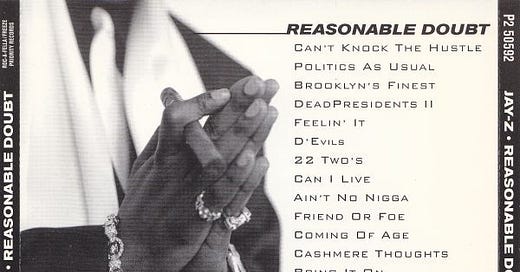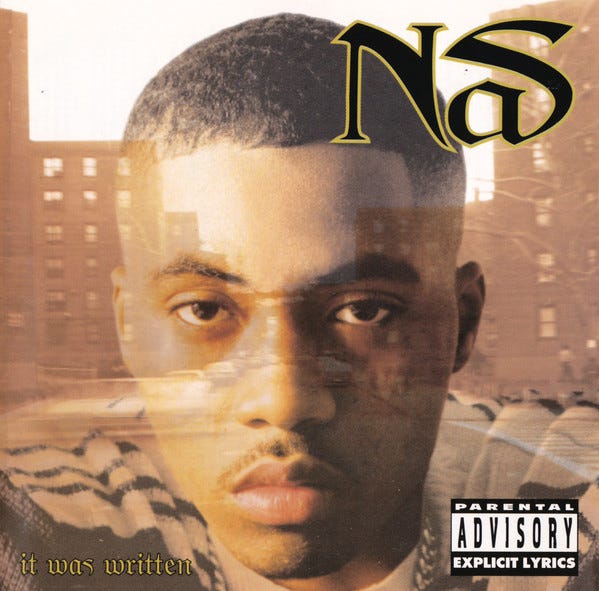Yes. 25 years ago, I was writing about hip-hop. In fact, plenty of it was in my own magazine, ego trip. ego trip is a New York-based underground periodical that I co-founded with Sacha Jenkins and three other partners, Jeff “Chairman” Mao, Gabriel Alvarez and Brent Rollins. I believe it was Mao who coaxed me, during the summer of ‘96 to write a “double review.” At the time I was the hip hop editor at College Music Journal aka CMJ. Later that year I became music editor of The Source.
But that summer, with a Jansport probably strapped tightly to my back, I sat down at an iMac to compare and contrast the works of two of hip-hop’s biggest albums at the time: Nas’ It Was Written and Jay-Z’s Reasonable Doubt. The two were released within a week of the other.
As you’ll soon read: I was Team Jigga. Hip-hop needed a new leader. Shawn Carter forcefully stepped up as one. It’s crazy that he has never really stepped down. Happy RD Day, SC. On this date, you laid a foundation — artistic and audacious — for yourself, definitely, but for hip-hop overall. Blueprint still my favorite album tho.
ACTUAL REVIEW BELOW ⏬
In case you haven’t heard, “the Native Tongues have been officially reinstated.” While initially, Posdnous’ proclamation from De La’s “Stakes Is High” excited me like the flirt from a lovely young lady, I now find myself feeling indifferent about the artistic efforts of rap’s intelligentsia. Seriously, De La Soul’s Stakes Is High and A Tribe Called Quest’s Beats, Rhymes And Life are fine releases, and following the Fugees’ long-standing, still-goin album of the year, The Score, you could make the argument that the state of hip-hop is now better than it’s been in years. But that would be misleading. Although good hip-hop music always flourishes through troubled times, sometimes the public chooses a candidate for hip-hop’s presidency that doesn’t deserve the nomination.
As we reach the close of the summer, two of this season’s most important records, Nas’ It Was Written and Jay-Z’s Reasonable Doubt, are still lingering in my mind. While Jay, the author of the gold double-sided 12-inch, “Dead Presidents”/“Ain’t No Nigga,” has an album that’s selling at a moderately steady pace, Nas is reigning supreme on—of all places—the top of the Billboard pop charts. Who could have predicted that hip-hop’s favorite son, Nasir Jones, would become a certified pop phenomena? Yes, Nas’ 1994 debut Illmatic was an underground masterpiece. And while they caught their fair share of flack for it, the old-school editors at The Source magazine were right when they awarded it the coveted five-mic rating that proclaimed it a hip-hop classic. However when Illmatic struggled in the marketplace, don’t think anyone at Nas’ label, Columbia, felt content with critical kudos.
Returning on It Was Written with the commercially-proven production team the Trackmasters—with whole he shares management—Nas does his best to make their collaboration effective. Unfortunately, he is subverted by the record’s attempts at providing a universal vibe. The extra-cheesy, disco groove of the Eurythmics-inspired “Street Dreams,” the N.O Joe-like synthesized laziness of “Watch Dem Niggas” and the lyrically enchanting, but superficial and bubbly “Black Girl Lost,” are representative of the more “mature” Nas sound. Even worse, It Was Written’s Dr. Dre-Nas marquee match-up, “Nas Is Coming,” winds being its ultimate low-light. An underwhelming, over-produced shot at bi-coastal unity that Dre should be ashamed to have his name credited on.
Nas is better served when he sticks to his street instincts: Collaborating with Mobb Deep on the clever “The Set Up” and the pulsating “Live Nigga Rap,” establishing his clique, The Firm (AZ, Cormega and the maligned Foxy Brown), on the Godfather bob of “Affirmative Action” and exhibiting exhilarating storytelling skills on “Shootouts.” These moments all hint that somewhere within the gold-plated body of Nas beats a heart that still feels a part of the troubled streets of his hometown of Queensbridge.
Equally proud of his roots and status as a product of his environment is Brooklyn’s Jay-Z, who was first introduced to rap fans as the sidekick of fellow Marcy Projects MC Big Jaz on tongue-twisting tracks like “The Originators”. After experiencing his ups and mostly downs in the music business, Jay decided to take matters into his own hands and formed Roc-A-Fella Records. Ever since, his future has become so bright that he may need to borrow his homie, Biggie Smalls’ Versace shadees.
In fact, the Notorious B.I.G. crashes the block party that is Reasonable Doubt, on the busted Ohio Players-loop that composes “Brooklyn’s Finest.” Elsewhere, Big Poppa’s subtle influence also pervades. Like Biggie, Jay-Z wins with his classy Crooklyn tales of illegal drug transactions. “Dead Presidents II” is a stunning sequel to its original with Jay’s soon-to-be classic line: “Without rap, I was crazy straight/Partner, I’m still spending money from ’88.” But whether or not Jay really dabbled in the drug game as a youth, his realistic tales are unequivocally convincing. “Friend Or Foe’s” a thuggish, rogue-ish monologue sounds like a page ripped from the Pulp Fiction script; “Coming Of Age,” features Jay schooling a young cat, Memphis Bleek, on constructing a successful illegal lifestyle; these songs, along with the DJ Premier-constructed masterpiece “D’Evils,” all provide insight into the mind of an intelligent brother determined to get the green by any means. Self-reflective tales like the poignant “Politics As Usual,” the spirited “Feelin’ It” and the album’s centerpiece, the enchanting “Can I Live,” leave us rooting for our troubled hero to emerge acquitted by the end of the disc.
In many ways, Jay-Z is the personification of everything Nas wishes to become. While Jay is a confident but low-key Big Willie who whips his custom-made Lexus through dangerous areas, an introverted Nas looks out his bedroom window and dreams of one day owning such a travel mobile. Thanks to Lauryn Hill of the Fugees, who’s sultry vocal tones on “If I Ruled The World” spurred It Was Written’s commercial payback, Nas is now privy to any and all perks a young man could want. Nas has been blessed by the Fugees’ quadruple-platinum touch and all Jay-Z has at his disposal is the sore-throat assistance from hip hop’s non-crossover queen Mary J. Blige on “Can’t Knock The Hustle.”
It may be unfair to dismiss Nas’ success as merely a piggyback ride on the back of L Boogie and her Refugee Camp, but I can come to no other conclusion for this year’s most surprising success story, as almost overnight, Nas-the-Martyr has become Nas-the-Superstar. Meanwhile, Jay-Z is somewhere lounging on a leather couch sipping an ice-cold bottle of Moet. Since he still runs his own operation and puts put his own shit, Jay-Z, when all is said, done, and divvied up, will probably make more money.
Sorry Nas, the world is still up for grabs.
—Warren Coolidge [I wrote record reviews under this alias for a bit. Word to The White Shadow.]
This is a test return of The Motto. We’ll see how it goes.
@elliottwilson tweets | @elliottwilson IG | follow HRDlist
a danyelliott production
Danyel Smith + Elliott Wilson











"In many ways, Jay-Z is the personification of everything Nas wishes to become." Look at you being prescient.